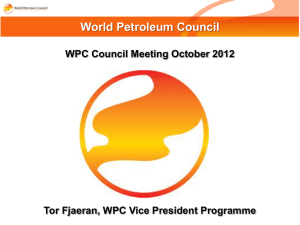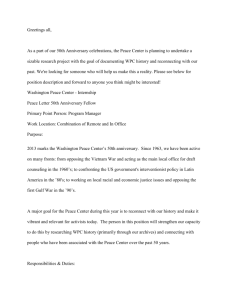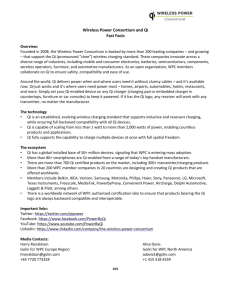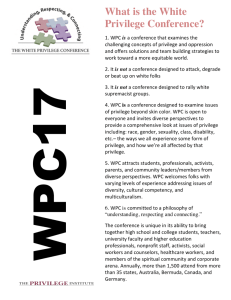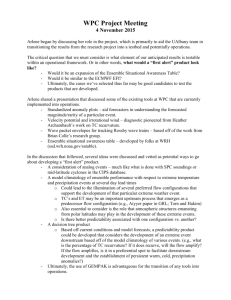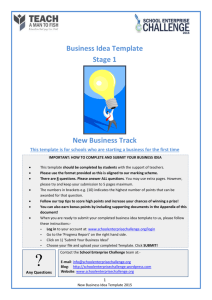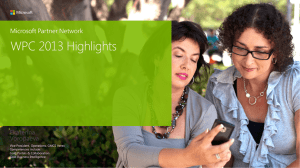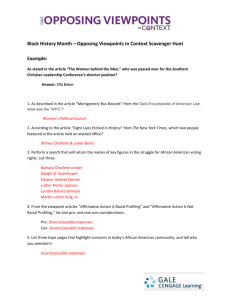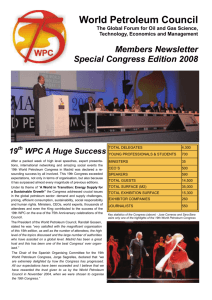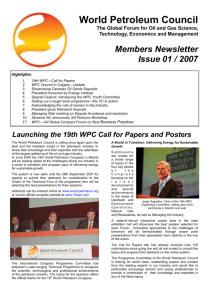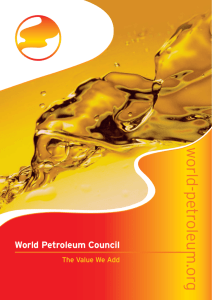Who Attends the WPC?
advertisement
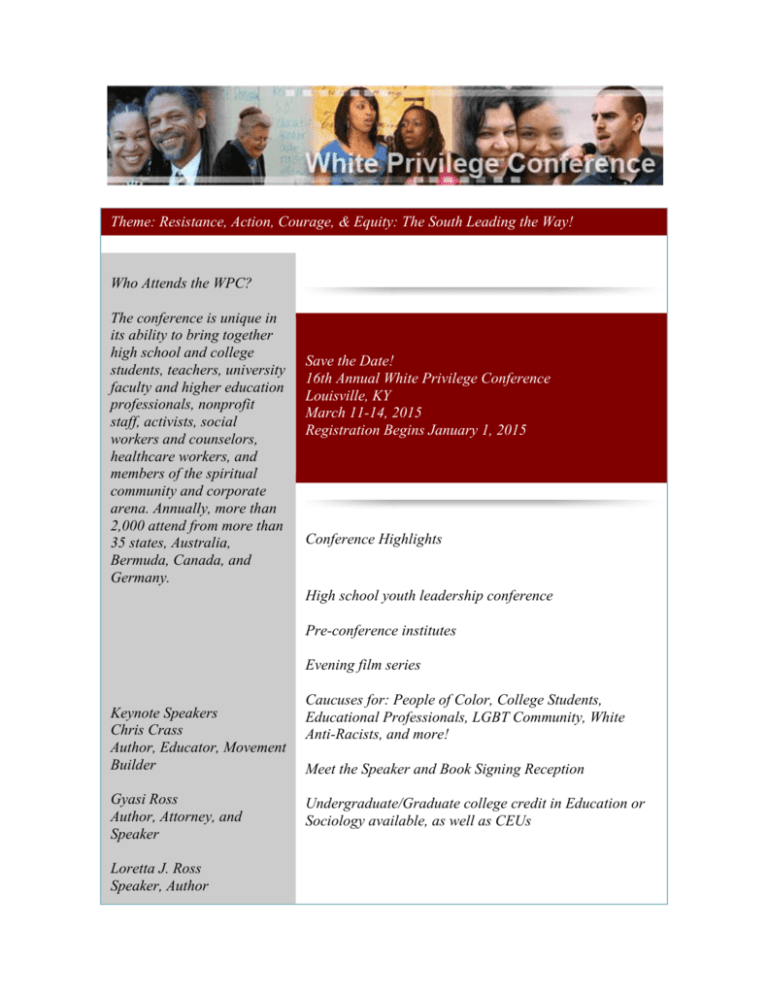
Theme: Resistance, Action, Courage, & Equity: The South Leading the Way! Who Attends the WPC? The conference is unique in its ability to bring together high school and college students, teachers, university faculty and higher education professionals, nonprofit staff, activists, social workers and counselors, healthcare workers, and members of the spiritual community and corporate arena. Annually, more than 2,000 attend from more than 35 states, Australia, Bermuda, Canada, and Germany. Save the Date! 16th Annual White Privilege Conference Louisville, KY March 11-14, 2015 Registration Begins January 1, 2015 Conference Highlights High school youth leadership conference Pre-conference institutes Evening film series Keynote Speakers Chris Crass Author, Educator, Movement Builder Gyasi Ross Author, Attorney, and Speaker Loretta J. Ross Speaker, Author Caucuses for: People of Color, College Students, Educational Professionals, LGBT Community, White Anti-Racists, and more! Meet the Speaker and Book Signing Reception Undergraduate/Graduate college credit in Education or Sociology available, as well as CEUs Dr. Mab Segrest Professor of Gender & Women's Studies, Connecticut College (retired) Author, Scholar and Activist About the WPC Since its inception in 1999, the founder, Dr. Eddie Moore Jr., has persisted beyond misperceptions of the White Privilege Conference's (WPC) name to present a transformational experience based on three tenets: understanding, connecting and respecting. The WPC has become a venue for fostering difficult and critical dialogues around white privilege, diversity, multicultural education and leadership, social & economic justice, and intersecting systems of privilege and oppression. Understanding & Dismantling Privilege Journal www.wpcjournal.com For more information about the concept, the conference, and registration, please go to whiteprivilegeconference.com TESTIMONIALS FROM PAST WPC PARTICIPANTS “As an educator and activist I wholeheartedly encourage young people participating in the WPC. It is a challenging, rigorous, and supportive environment which promotes critical thinking skills and leadership development. It is a unique, one of a kind experience that can create a long lasting positive impact for young people of all backgrounds.” JLove Calderon, Author, Activist, Educator “As you well know, I believe the conference to be a great educational and self-reflective space to introduce youth and those who work with them to a structural framework to better understand power and privilege. Not only in the context of race but in the context of faith, gender, language, etc.” John-Paul Chaisson-Cardenas “In short (or trying to), I must mention, in all reality, that WPC was a life changing event for me. I went into my first conference as a very unaware college student and came out of it a completely different person with pages and pages of notes detailing the experience. Although it is sometimes difficult to admit, I wrote how disheartening it was that the very first time anyone taught me anything about race was at WPC! As I continued to grow and further my ability to recognize oppressive situations, I realized that WPC didn't just teach me about race, it helped me become an advocate within my community, a compassionate young professional, and a devoted activist. Currently (three+ years after my first WPC), I am a leader within my community, working toward helping other leaders become educated, compassionate and active in many different sectors of their communities. I'd be happy to answer any other questions for your colleague and the proposal. I can't say enough about the type of experience provided at WPC.” Nicole R. Crosby “As Principal of Holmen High School in Wisconsin I was able to see firsthand the impact that the WPC had on staff and students who attended the conference. Students who attended came back with a understanding of the importance of promoting diversity not only in the school but the community. Students started a Diversity Program called SEEDS (Students Envisioning Equity and Diversity in the School) which has promoted and fostered a better understanding in the school and the community. This conference is a great opportunity for students to experience diversity first hand.” Bernie L. Ferry “Though I’ve been to the WPC twice as a chaperone of high school students and as a participant, I have also helped organize and facilitate the preparation, fund raising and debriefing of high school students attending the last 5 WPC’s. Without a doubt this is the most effective and valuable professional conference I’ve attended during the 20+ years I’ve been in education. Further, I’ve observed the impact it has had on our students as being as effective and valuable. Students, no matter what ethnicity, nationality, race, religion or sexual orientation have shared and demonstrated that their lives have been changed by this experience. The unique environment of immersion and the intentional support and reflection built into the conference has allowed them to explore their own, as well as, others’ experiences and perspectives around issues of social justice and privilege. This has truly been a life changing experience for our students.” John Ganz “As the founder of EdChange and a university professor, I have been to dozens of conferences related to diversity, cultural competence, leadership, and multiculturalism, most of which have included a component for youth. Usually, the youth components are less educational than fluffy--students leave having made a few friends, but without learning anything substantial about how to participate in authentic ways in a diverse institution or society. The White Privilege Conference is the exception. I've seen young people I know grow in substantial ways from attending the conference and I've watched as they've brought their lessons back to their institutions, becoming models of leadership for diversity.” Paul Gorski “Have you heard about the WPC? Ever considered going? Well, this is an opportunity that shouldn't be missed! The keynote speakers are high caliber, the opportunity to meet and engage with other folks committed to undoing racism and oppression are unparalleled, the opportunity and space to "get real", and lastly, having the time to learn from, talk, listen and engage with people doing the work of social justice/anti-oppression.WPC is thoughtful, emotional, spiritual, reflective, beautiful, community oriented, engaging...oh, it is good. Think about it. It's a way to step out of the mundane, reconnect with the passion that fuels the fire, learn something new, and grow with other folks doing this collective work of social justice, anti-racism and anti-oppression.” Stephanie Jones "I find WPC to be such a great way for health providers and health educators to enhance their cultural competency because it (WPC) offers many wonderful opportunities for participants to better understand how white privilege affects and limits people of color's ability to fully access resources and fully participate in our society. As a mental health provider, I certainly find it important to make sure ALL people benefit from mental health services and I have learned a great deal by attending WPC in the past 5 years." Hsiao-Wen Lo "There is no better way for people to experience the lifechanging effects of immersion in a community that models both activism and analysis than attending WPC, where personal growth and institutional change are mutually supportive, novices engage with experts, and academic scholarship fuses with street smarts in an atmosphere that pulls off the very difficult feat of being both supportive and challenging for all." Harry Brod "To rename the conference would be to fully undermine the clear and direct message the conference has powerfully succeeded in sending in my many years of attendance and presenting. We must not fear naming white identity, privilege, and supremacy as the key forces of oppression in our long and very troubled history. This conference, more clearly than any other "diversity" conference I have encountered, asks attendees and presenters to consider the multiple manifestations of white privilege and supremacy. I am white and have participated and presented in many WPC gatherings. Never have I felt individually attacked. The many moments of great discomfort constituted great learning opportunities for me (when I was willing to be receptive). There is no other conference like the WPC and the success of the conference begins absolutely with its title." Bob Cooley
